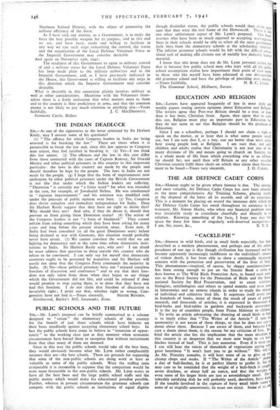THE INDIAN DEADLOCK
SIR,—As one of the signatories to the letter criticised by Sir Herbert Kealy, may I answer some of his questions?
(t) "The offence for which Congress leaders in India are being arrested is for breaking the law." There are times when it is permissible to break the law and, since this law appears to Congress men unjust, they feel justified in breaking it. (2) Yes—I too think this law unjust. (3) The offences and the law in this case differ from those connected with the cases of Captain Ramsay, Sir Oswald Mosley and other political prisoners in this country in this important particular: the laws in this country are made by the people and should therefore be kept by the people. The laws in India are not made by the people. (4) I hope that the form of imprisonment now undergone by other political prisoners under the British Government is not like that under which the Indian leaders are suffering. " Detention " is certainly not " a fairer word " for what was intended in the case, for example, of Jawaharlal Nehru. He was condemned to " rigorous imprisonment " and his sentence was modified only under the pressure of public opinion over here. (5) Yes, Congress does desire complete and immediate independence for India. Does Sir Herbert Kealy suggest that they have no right to desire this? Why should they not? And why, if they do desire it, should that prevent us from giving them Dominion status? (6) The action of the Congress leaders is not " a form of blackmail." They cannot refrain from asking something which they have been asking for many years and long before the present situation arose. Even now, if India had been consulted (as all the great Dominions were) before being declared at war with Germany, this situation would probably never have arisen. (7) We cannot convince the world that we are fighting for democracy and at the same time refuse democratic insti- tutions to India. Sir Herbert Kealy says, why not? I am afraid he must address that question to those outside this country who do refuse to be convinced. I can only say for myself that democratic countries ought to be governed by majorities and Sir Herbert will surely not deny that the Congress Party commands the majority in India. (8) No—these political prisoners have not " enjoyed complete freedom of discussion and conference " and to say that their free- dom was only taken from them when they began to say things which the Government did not like, and could be released if they would promise to stop saying them, is to show that they have not had this freedom. I do not claim that freedom of discussion is invariably right ; I point out that, whether right or wrong, Con-
gressists have not had it.—Yours sincerely, MAUDE ROYDEN. Nestlewood, Bayley's Hill, Sevenoaks, Kent.






























 Previous page
Previous page